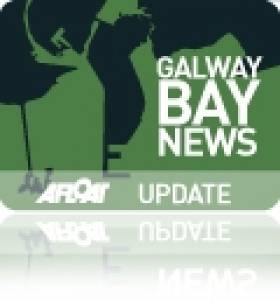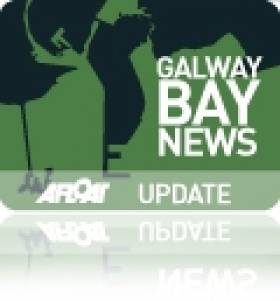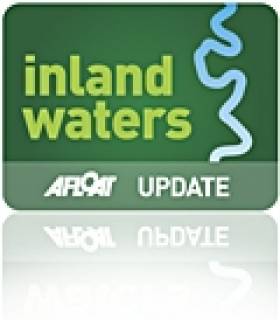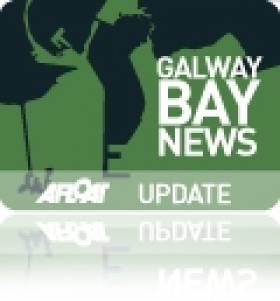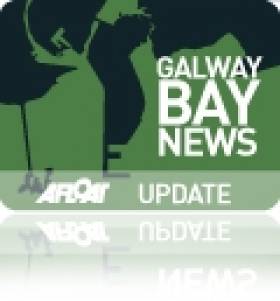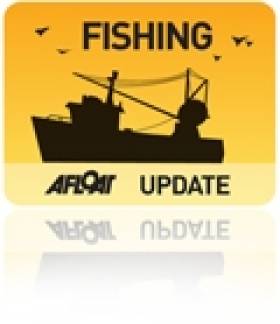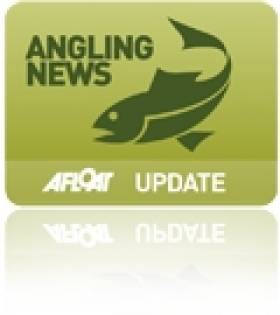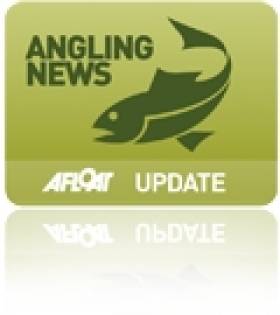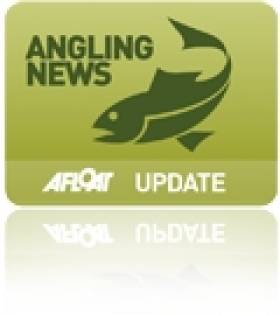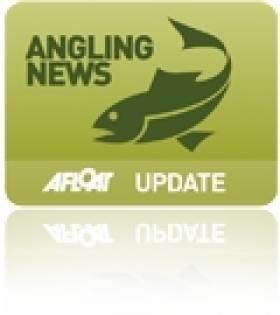Displaying items by tag: Inland Fisheries Ireland
Angling Writer 'Deeply Concerned' Over Aran Islands Fish Farm Plans
#GALWAY FISH FARM - In his latest angling column for The Irish Times, Derek Evans writes of his 'deep concern' over the proposed deep sea salmon farm off the Aran Islands in Galway Bay.
Making reference to new research that shows infestations of sea lice - which often concentrate in fish farms - pose a significant threat to the survival of wild salmon fisheries, as previously reported on Afloat.ie, Evans writes that the "untold damage" from such infestations would be "nothing short of catastrophic".
He adds: "While this latest proposal is a step in the right direction in terms of its 'off-shore' location, nevertheless, it will bring a plethora of problems, beginning with the size of its annual output and the 'baggage' that entails if and when it moves into unchartered waters."
Evans also points to the submission on the Environmental Impact Statement (EIS) made by Inland Fisheries Ireland (IFI), which includes "an additional checklist for consideration including the location and dimension of this proposed farm; site characteristics; production process; potential impacts; monitoring; and organic farming", as well as suggesting an assessment of all wild salmon fisheries in the affected area, plus a full monitoring system and baseline study.
Evan's comments come in the wake of IFI's dispute with Bord Iascaigh Mhara over the exclusion from the statutory consultation of a report critical of the proposed salmon farm off Inis Óirr, which has faced opposition from local salmon anglers.
The Irish Times has much more on the story HERE.
IFI Board Issues Statement on Galway Bay Fish Farm
#GALWAY FISH FARM - The board of Inland Fisheries Ireland (IFI) has issued a statement on the proposed Aran Islands deep sea salmon farm in Galway Bay, which has been the source of some controversy in recent weeks.
The board said it agrees with the recent statement by Minister Fergus O’Dowd on offshore salmon farming, and that it welcomes the development of Ireland’s aquaculture sector "once any development complies with Ireland’s obligations under relevant EU environmental legislation, particularly the Habitats Directive, and does not adversely affect salmon and sea trout stocks."
In addition, the IFI board said it has made a submission on the Environmental Impact Statement (EIS) prepared by Bord Iascaigh Mhara (BIM) for the proposed offshore salmon farm as part of the public consultation process, which is available on the IFI website.
As previously reported on Afloat.ie, the public consultation period began last month for the 500-hectare organic fish farm to be located off Inis Oirr. BIM has applied for a deep sea salmon farming licence at the site, which would be one of the largest of its kind in Europe. If approved, the operation could more than double Ireland's current farmed salmon production rate.
The IFI board's statement notes: "In the submission, concerns were raised in relation to the location and scale of the proposed salmon farm and how its development and operation could impact on wild salmon and sea trout stocks and their habitat.
"These concerns are based on scientific reports by respected authors and knowledge of the impact of existing fish farms on salmon and sea trout populations off the west coast of Ireland."
The submission also highlights "recent peer reviewed international scientific literature on the impacts of sea lice on salmonids" which poses a significant threat to wild salmon in Irish waters, as reported on Afloat.ie.
The board said it does not believe "that the corpus of peer reviewed international scientific literature which recognises the negative impacts of sea lice on salmonids have been adequately dealt with in the EIS".
While welcoming "any sustainable initiative which will provide jobs in rural coastal communities", the IFI board said it questions the figure of 500 jobs it's been reported the 15,000-tonne fish farm project would create, making comparison to a new 2,000-tonne aquaculture scheme in Scotland that's expected to create just four full-time positions.
The board members say they "have serious concerns that whatever the number of jobs created by the current proposal, they will be more than offset by the associated loss of jobs in the recreational angling and tourism sectors" if the scheme results in any negative effects on those areas.
"Ireland's reputation as a pristine wild fishery destination must be safeguarded," they added, noting that proposals for two further offshore salmon farms in Mayo and Donegal "are premature given that significant issues over the current proposal have not yet been resolved.
"No further applications should be progressed until all stakeholders are satisfied that the current proposal is sustainable and has no adverse impact on wild salmon and sea trout stocks."
Inland Fisheries Ireland is the State agency charged with the conservation, protection, development management and promotion of Ireland's inland fisheries and sea angling resource.
Sea Lice Pose Significant Threat to Wild Salmon Says New Research
#ATLANTIC SALMON - About 39% of salmon mortalities were attributable to the impact of sea lice on wild salmon fisheries, according to a new international study.
The research, published in Proceedings of the Royal Society B, involved experts from Inland Fisheries Ireland collaborating with the Scottish Oceans Institute at the University of St Andrews, the Department of Zoology at the University of Otago in New Zealand, the Atlantic Veterinary College at the University of Prince Edward Island in Canada and the Institute of Marine Research in Norway.
In a statement on the report, IFI says: "In previously published studies, groups of salmon smolts were treated to protect them against sea lice infestation and other groups were untreated and both groups released to sea into 10 areas of Ireland and Norway. A proportion of these released fish were recaptured as adult salmon one or more years later.
"Analysis of the results of all previously published studies together provide experimental evidence from a large marine ecosystem that sea lice can have large impacts on salmon recruitment, fisheries, and conservation. The sea lice were likely acquired during early marine migration in areas with salmon farming, which elevate local abundances of sea lice."
IFI says the results "indicate that parasite-associated mortality may cause the closure of some fisheries when conservation targets of return adult abundances are not being met. However, the implications of these results may be most serious for small populations in small river systems."
The inland fisheries body explains that the high natural mortality rate of both treated and untreated salmon groups was accounted for, which revealed "a large effect of parasites".
"Precisely because natural mortality rates are high, even a proportionally small additive mortality from parasites can amount to a large loss in adult salmon recruitment," it adds.
Minister of State for Natural Resources Fergus O'Dowd welcomed the report, stating: “From the results of this detailed study, it is crucial that sea lice levels are maintained below [designated] protocol levels, particularly in spring when wild salmon smolts are migrating to sea to avoid increased marine mortality.
Minister O'Dowd added that the results of this study "augment our knowledge in the context of proposals for aquaculture development".
The news comes in the wake of IFI's dispute with Bord Iascaigh Mhara over the exclusion of a report critical of the proposed new deep sea wild salmon farm in Galway Bay from the statutory consultation.
The scheme has faced opposition from local salmon anglers who fear the new facility would pose a threat to wild salmon stocks in Irish rivers by increasing the risk of sea lice infection.
BIM Brings Fish Farm Consultation to Aran Islands
#GALWAY FISH FARM - Galway Bay FM reports that a series of direct public consultations on the proposed Aran Islands fish farm in Galway Bay will begin this week.
Bord Iascaigh Mhara (BIM) is organising the meetings on the islands and in nearby Galway City to allow the public to view its proposals for what would be one of the largest aquaculture operations in Europe.
As previously reported on Afloat.ie, the public consultation period began last month for the 500-hectare organic fish farm to be located off Inis Oirr. BIM has applied for a deep sea salmon farming licence at the site some 6km off the island.
If approved, the operation could more than double Ireland's current farmed salmon production rate.
The scheme has faced opposition from local anglers and from Inland Fisheries Ireland, who claim it poses a risk to wild salmon stocks.
But BIM has condemned IFI's "stop everything" attitude regarding the fish farm proposals, while accusing environmental campaigners of being "deliberately alarmist", according to the Galway Independent.
Lobby group Friends of the Irish Environment entered a dispute with the sea fisheries board over the exclusion of an IFI report critical of the salmon farm from the statutory consultation.
“In the current climate, with jobs being as scarce as they are and economic development being the way it is, I think really that sort of attitude, that sort of museum curator ‘stop everything’ attitude is not good enough,” said BIM aquaculture development manager Donal Maguire.
Campaigners In Dispute with BIM Over Galway Bay Fish Farm Report
#GALWAY FISH FARM - Environmental campaigners have retracted their accusation that Bord Iascaigh Mhara (BIM) suppressed a report critical of the proposed deep-sea fish farm in Galway Bay.
The Galway Independent reports on a statement released by lobby group Friends of the Irish Environment, which claimed that BIM tried to hide the study by not posting it on its website along with other materials made available for the public consultation period.
The report in question was commissioned by Inland Fisheries Ireland and is critical of the Environmental Impact Statements carried out on the proposed location for the 15,000-tonne organic salmon farm off the Aran Islands.
As previously reported on Afloat.ie, the salmon farm would be located on a 500-hectare site off Inis Oírr, and would be one of the largest of its kind in Europe, projected to be worth €103 million annually for the economy. The scheme has faced opposition from local anglers who fear it could have a negative impact on wild salmon numbers.
BIM strongly denied any wrongdoing, and the lobby group subsequently retracted its allegations upon learning that the IFI report had missed the deadline for submissions for the consultation.
“BIM certainly did not suppress or ignore or gloss over anything from IFI, because we never received anything," said a BIM spokesperson.
However, Friends of the Irish Environment now alleges that the IFI report was late due to a delay in their receipt of the Environmental Impact Statement from BIM.
The Galway Independent has more on the story HERE.
IFI Seizes Illegal Bass and Nets Off Waterford and Wexford Coast
#FISHING - Inland Fisheries Ireland has in the last week seized illegally caught bass off the Wexford coast and illegal fishing nets off the Waterford coast.
While the specifics of these cases are not being released for legal and operational reasons, IFI says that the successful seizures are the result of "the flexibility and dedication of IFI staff".
The national fisheries body said that these types of seizures are often initiated following significant covert, intelligence-led policing operations which are carried out during both day and night time.
In both instances off-duty fisheries staff were quickly mobilised to execute the seizures.
The regional director at IFI praised the staff involved in the operation and described the seizures as very important in the protection of Ireland’s bass, salmon and sea trout resource.
It is widely held that illegal coastal fishing could have devastating consequences on the nation's valuable fishery resource.
Man Prosecuted for Illegal Fishing on Mulkear River
#ANGLING - A man has been convicted and fined at Limerick District Court for illegally fishing without a permit on the Mulkear River in another successful prosecution for Inland Fisheries Ireland (IFI).
Last June, fisheries officers with IFI were carrying out a routine licence and permit patrol on the Mulkear River in the east of Co Limerick, in an area locally known as the 'Long Field'. One individual - a Mr Storan - was angling without a permit or State licence and was issued with an on-the-spot fine which had to be paid within 21 days.
The fine remained unpaid, and following several court proceedings and a bench warrant, the case was heard on 17 September and Mr Storan was convicted under Section 178 (Unauthorised entry on a several fishery). He was fined €250 and instructed to pay €400 in expenses to IFI.
IFI said: "This successful outcome was the part of the commitment of Inland Fisheries Ireland to focus on the protection of fish, especially during a time of resource constraints."
The Mulkear River is one of only two rivers which meet its salmon conservation limit in the Shannon River Basin District and angling is therefore permitted for wild salmon, subject to a licence and quota.
According to IFI, currently the river "holds excellent stocks of wild salmon, but incidents such as these are extremely detrimental and will threaten the integrity of the stocks in the river."
IFI's Limerick director Amanda Mooney commented: “This case could have been dealt with through our on-the-spot fine procedures but the individual chose to go to court where the fine was much greater.
"Inland Fisheries Ireland is committed to the protection of our wild salmon stocks and follow through on all fisheries offences.”
IFI continue to run a 24/7 hotline where anyone can report illegal fishing activity at 1890 34 74 24 or for easier recall 1850 FISH 24.
Generosity of Agencies, Businesses Saves Rosslare Small Boats Festival
#ANGLING - For the third time in four years an Irish boat has won the Rosslare Small Boats Festival, which took place from 8-15 September.
In what was an extremely tight competition, Screaming Reels from Rosies Sea Angling Club in Cork won the competition with 24 different species of fish, beating 28 other boats from the UK.
Sponsored by Inland Fisheries Ireland (IFI), Fáilte Ireland and Sea Angler magazine, the event - now in its 27th year - attracted more than 85 anglers from the Isle of Wight, Southport, Liverpool, Wales and Ireland.
This year’s event faced some challenges, most notably that prior to the competition going ahead the accommodation company Self Catering Ireland went bust in July, meaning the anglers had nowhere to stay.
IFI and Fáilte Ireland came to the rescue by sponsoring the prizes to the tune of €3,000, with the original prize fund going to refinance accommodation for participants.
This generosity was replicated by local businesses who realised the importance and the value of this competition to Wexford, and many prizes were received. These included donations from Sea Angler magazine, Sefton Sea Anglers, Wirral Boat Angling Club in Liverpool, Kelly’s Resort Hotel and Spa, Redmond’s The Bay, Grangewood Holiday Homes, Grangecove Holiday Homes, Southside Angling, Kilmore Quay Harbour office and Widgeon’s Rest.
The weather conditions proved to be very challenging for the competition, with southwesterly winds making boat angling very difficult.
However as the week wore on, conditions improved slightly and competitors managed to fish the normally four-day competition in three days by launching their boats once from Kilrane in Rosslare and twice from Kilmore Quay, and fishing restricted areas along the Wexford coast.
A great variety of fish were recorded during the week with 30 different types of species including coalfish, dogfish, dab, flounder, pollack, bull huss and some unusual species such as sea scorpion, shanny and tadpole fish.
There were also some fantastic specimen fish reeled in during the week including a triggerfish of 2.32kg caught by well known UK angler and writer Gordon Thornes from the boat Uptide Girl, which is very close to the Irish record of 2.54 kg.
Two other specimens recorded include a fine ballan wrasse of 3.16kg caught by Neville Murphy from Cork and a smoothound of 3.78kg caught by Seirt Shults of Dundalk, both from the winning boat Screaming Reels. (All specimen fish are pending verification by the Irish Specimen Fish Committee.)
The competition was exciting from start to finish due to the close results each day, despite the changeable weather conditions. And the overall results demonstrated this, with first place going to Screaming Reels (Martyn Rayner, Seirt Shults, Neville Murphy) with 24 species for 23.12kg - followed closely in second place by Uptide Girl (Gordon Thornes, Mike Roberts and John Williams from Wallasey in the UK) with 22 species for 25.15kg. In third place was Nirvana (Richie Stead and Keith Pemberton from the Wirral Boat Angling Club in Liverpool) with 20 species for 13.78kg.
The heaviest round fish was a conger of 8.18kg caught by Leslie Trish of Seeker V from Liverpool, who was also awarded a perpetual trophy sponsored by Inland Fisheries Ireland for the biggest fish caught. The heaviest flat fish was a plaice of 0.80kg caught by John Meaning from Joe 90 from the Isle of Wight. Fifteen-year-old Lewis Radcliffe from Wigan won best junior of the competition, fishing with his dad Simon and his grandfather on the boat Cod n Bas’ which came fifth with 19 species for a 13.04kg total.
Redmond's The Bay on Rosslare Strand hosted the prizegiving ceremony for the second year running. Prizes were presented by Suzanne Campion, director of business development at Inland Fisheries Ireland and Orla Woods, projects officer for destination development with Fáilte Ireland.
Campion commented that the festival "is very important not only to promote the great sea fishing we have on the east coast, and in particular the variety of species available, but also the investment it brings to the local businesses in the area each year."
She also thanked Phil Hallsworth, who has organised this festival for the last 12 years, for his "hard work, commitment and dedication" now that he is retiring from the event.
Next year’s Rosslare Small Boats Festival will take place on 14-21 September 2013, and IFI invites all small boat anglers to take part. Further information is available from Josie Mahon at 01 278 7022 or [email protected].
Double Court Win for IFI Over Illegal Boyne Salmon Fishing
#ANGLING - Inland Fisheries Ireland (IFI) has successfully won two court cases for illegal salmon fishing on the River Boyne in 2011.
In the first case Arunas Butkus of Navan, Co Meath was fined €3,000 for illegal salmon angling and ordered to pay total costs of €1,395 to IFI in Navan District Court on 25 July last.
On 15 November 2011, Butkus was found to be fishing during the annual close season for salmon on the River Boyne. Fisheries officers Fionnuala McCabe, Val Woods and Kevin O’Brien from the Drogheda District apprehended him, whereupon an incorrect address was provided.
Butkus was not represented in court. Judge McMahon convicted him under Section 137 of the 1959 Fisheries Act for fishing out of season and under Section 301 for refusing to give his name and address when lawfully demanded. He was fined €3,000, given six months to pay and ordered to pay total costs of €1,395 to IFI.
In the second case, Anthony McDonagh was fined €150 for fishing without a salmon licence and ordered to pay total costs of €1,650 to IFI in Drogheda District Court on 12 July last.
On 22 September 2011, McDonagh was found to be fishing without a salmon licence on the River Boyne. He was apprehended by Assistant Inspector Kevin O’Brien and Fisheries Officer Val Woods whereupon he gave a false name and address.
McDonagh pleaded guilty and Judge Flann Brennan convicted him under Section 303 of the 1959 Fisheries Act for failing to produce a licence on demand and under Section 301 for refusing to give his name and address when lawfully demanded. He was fined €150 for fishing without a rod and line and ordered to pay total costs of €1,650 to IFI in Drogheda District Court.
According to IFI, the River Boyne was was once one of the most prolific waterways for salmon on the east coast. In the 1980s approximately 10,000 salmon ran the systemm, but this declined to an all-time low in 2006 when fewer than 1,000 were caught on the river.
In 2006 IFI introduced a series of conservation measures in order to combat the decline in salmon numbers. The interceptory mixed stock fishery for salmon ceased throughout Ireland and netsmen who availed of the Hardship Scheme were duly compensated for their loss of the salmon fishery.
Consequently all the rivers on the east coast with the exception of the River Fane were closed for salmon fishing. The River Boyne is open for catch and release only and in 2011 a total of 824 salmon were caught and released on the river.
IFI said it hopes these measures will preserve our stock of Atlantic salmon, which are "not only a valuable resource for our economy, but also an important part of our natural heritage as salmon and trout have been running our rivers since the last ice age".
Anglers and the general public are also urged to be vigilant and report any incidences of illegal fishing via the IFI's special freefone number at 1890 34 74 24, or for easier recall 1890 FISH 24.
Biosecurity Initiative at Trout Fly Angling World Cup
#ANGLING - Inland Fisheries Ireland has teamed up with the committee behind the World Cup Trout Fly Angling Championship to develop a biosecurity initiative for the contest, taking place on Lough Mask from 2-6 August.
The premier event in the angling calendar will be contested by up to 500 keen fly fishermen from Ireland and abroad, each anticipating lifting the coveted World Cup.
The anglers that fish this competition realise the true gem that Lough Mask represents, providing quality angling in clean, unpolluted waters.
Towards that end, the biosecurity initiative aims to prevent non-native invasive species and harmful aquatic pathogens being inadvertently introduced into the lake on angling equipment.
Central to the initiative is that all anglers must disinfect their landing nets and boots each day before registering for the competition.
Anglers will be requested to co-operate with stewards on each morning and to bring their landing nets and boots with them to the registration centre. There, they will dip their gear in supervised disinfection tanks and receive a stamp from the Biosecurity Steward to show that they have used the facility.
Only anglers who can show this stamp to the Registration Officer will be registered to fish the competition on that day.
In recent years, despite considerable effort on behalf of IFI and many other angling and conservation groups, the non-native invasive Zebra mussel was introduced to Lough Mask.
Invasions elsewhere in Ireland's inland waterways include the notorious Asian clam, which has taken residence from the River Shannon to the Grand Canal.
The present biosecurity initiative - which follows the recent launch of a smartphone app to identify and report aquatic invasive species - represents an effort to make anglers aware of the dangers posed, and to alert them to the fact that other harmful and environmentally damaging invasive species are present on the island of Ireland, and that these can be inadvertently introduced to the lake on wet nets or soiled boots.
Information packages relating to the threats posed by invasive species will be available to anglers’ during the competition.



























